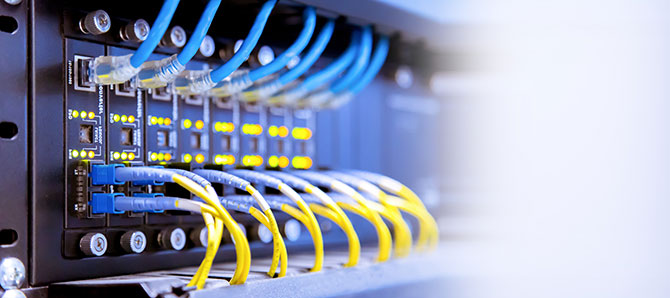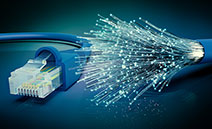
Fiber optic transmission has been around for more than 50 years, and it is the best choice for most IT projects. It may be invaluable for your next project, if you’re an internet service provider or another type of business that needs to provide people with Ethernet access over long distances.
Advantages of Fiber Optic Cable
Let’s look at the facts for a better understanding of the benefits of using fiber optic cables over copper cables.
1. Speed
Fiber optic cables beat copper in this department, and it isn’t even close. Fiber optic cables are made of tiny strands of glass, each about the size of a human hair, and use light pulses. Thus, they can carry a lot of data—up to 60 terabits per second—at speeds just slightly slower than the speed of light. Copper cables, limited by the speed at which electrons travel, can only reach about 10 gigabits per second.

If you need to transmit data (and a lot of it) in a short amount of time, fiber optic cables are superior.
2. Reach
Fiber optic cables are the better choice if you need to send a signal over greater distances. Copper cables can only carry signals about 100 meters, while some singlemode fiber optic cables can carry more data up to 25 miles. Fiber optic cable also carries data with less attenuation or signal loss—only about three percent every 100 meters—than copper, which loses over 90 percent over the same distance.
3. Reliability
Since they are electrical conductors, copper cables are still susceptible to interference and electrical surges. Fiber uses a process known as total internal reflection to carry light signals instead of electricity, so it’s not bothered by electromagnetic interference (EMI) that can interrupt data transmission. Fiber is also immune to temperature changes, severe weather and moisture, all of which can hamper the connectivity of copper cable. Plus, fiber does not present a fire hazard like old or worn copper cables can.
4. Durability
Able to withstand a pulling force of only around 25 pounds, copper wire is fragile when compared to fiber optic cables. Fiber, despite being much lighter, can withstand up to 200 pounds of pressure, which is certainly preferable during construction of a local area network (LAN).

Copper cables also experience corrosion and will eventually have to be replaced after as little as five years. Their performance degrades as they age, even to the point where they lose their signal all together. Fiber optic cables, on the other hand, are sturdier with fewer parts and can last up to 50 years. When you’re choosing a cable, its longevity should be taken into account.
5. Security
Your data is much more secure with fiber optic cables, which don’t carry electrical signals and are almost impossible to tap into. Even if a cable is compromised or damaged, it can easily be detected by monitoring the power transmission. Copper cables, on the other hand, can still be tapped, which could affect your internet speed or even destroy your network.
6. Cost
True, copper may seem to be the most cost-effective option because it costs much less than fiber optic cable. However, after you factor in hidden costs, maintenance, interference, risk of tampering and replacement cost, fiber optic cable is a better financial option in the long run.
7. New technology
Network devices that require more bandwidth, higher speeds and more reliable internet connectivity, such as security cameras, digital signage and VoIP phone systems, make fiber optic cable the obvious choice for those who provide telecommunications and internet.

Thanks to fiber optic cable capable of transmitting multiple modes of light, fiber is even finding its way into residential areas in some cities.
More information
For more information or to purchase fiber optic cable, check out Tripp Lite’s website. The company has knowledgeable professionals who can answer any questions as well as help you with any of your cable needs.






